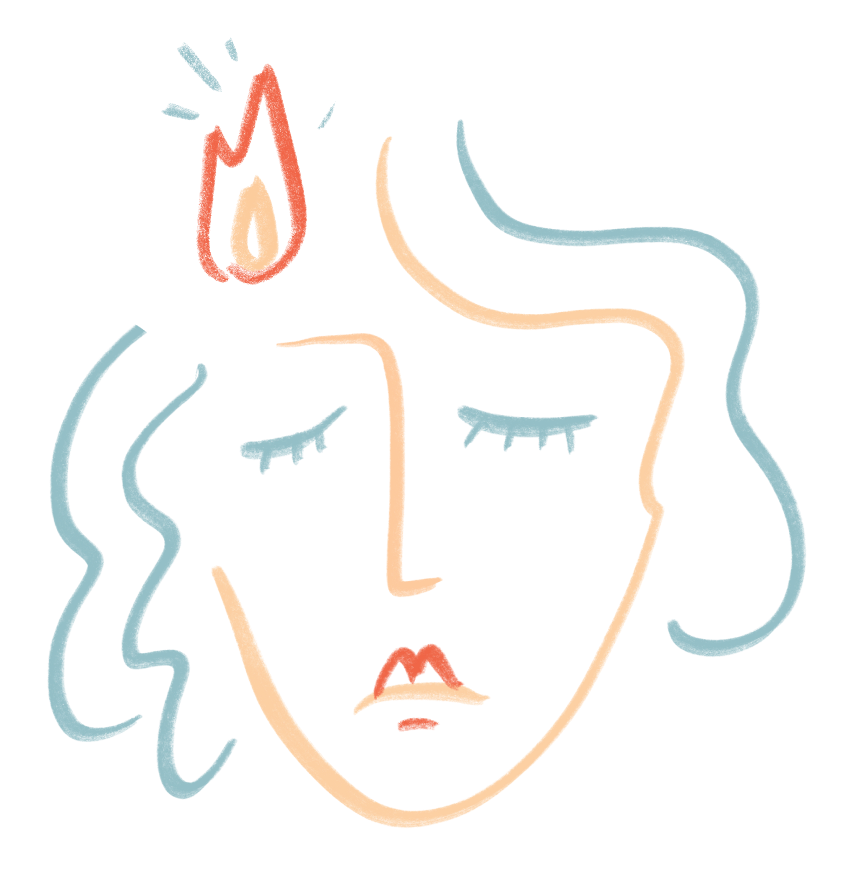LOW LIBIDO DEFINITION
When we discuss sexual desire or libido, we are talking about your interest or motivation to seek out and engage in sexual activities. Everyone’s level of desire is different – some might be satisfied having sex once every few months or years and for others, it might be once every few weeks or days.
Perhaps you are having no sex at all, and you feel totally satisfied and fulfilled – totally okay! There is no normal or right amount of sex to be having and low libido in menopause is only a problem if you think it is.
Discover your personalized treatment options

HOW LIKELY IS LOW LIBIDO IN MENOPAUSE?
- Difficulties with libido are some of the most prevalent sexual issues worldwide, particularly during menopause. While some find their desire for sex increases, most report the opposite. Studies have found that over 50% of those who are middle-aged reported having low libido.
Read more about the stages of menopause.
How can you improve low libido during menopause?
While hormones are not always to blame, they can play a big role. Reduced estrogen levels can affect nerves that provide feeling to the clitoris and vagina, making them less sensitive. The same hormonal changes can cause vaginal dryness, tightness, and increasingly delicate vaginal tissues, all of which can make sex uncomfortable and seem unappealing at best.
However, hormones aren’t the whole story. If you aren’t sure what turns you on, it may contribute to your distress about low libido or loss of libido during menopause.
Know your desire type and reframe the way you think about it
The first step to improving libido is to understand that there is more than one form of sexual desire. You have likely heard of spontaneous desire, which is that sudden and immediate desire for sex that often arises out of the blue. However, the most common form in women is responsive desire or when cues and triggers, such as a make-out session or back rub, cause your desire to grow. It is all about getting yourself into that headspace for sex.
Be open to getting in the mood
Sometimes you might feel neutral about having sex or would like to feel sexual but aren’t quite there yet. Consider being open to the possibility of responsive desire building. This does not mean forcing yourself to have sex or having sex out of obligation but rather staying open to getting in the mood and consciously creating opportunities for intimacy – perhaps with a cuddle or a massage. If you end up wanting to have sex, then great, but if not, you don’t have to.
Understand your brakes and accelerators
When you are experiencing low libido, you may often think that you need to step on the gas – more erotica, sex toys, a more attractive partner, etc. What you need to do is reduce the speed bumps that prevent the building of desire like stress, fatigue, and disconnection. Try Emily Nagoski’s Sexual Temperament Questionnaire to help you understand what impacts both you and your partner.
Improve foreplay
When it comes to good sex, foreplay is key to building anticipation and creating intimacy. Kissing and cuddling are important but foreplay could also include things like scheduling sex, sending a sexy text, or wearing underwear that makes you feel sexy.
Improve communication
Communication is essential to cultivating your libido and sexual satisfaction. If you are experiencing a decreased interest in sex, let your partner know.
Try sensate focus
Sensate focus is an effective sex therapy technique that helps people overcome libido problems by focusing primarily on sensations and not focusing on orgasm as the goal.
Mindfulness practice
Mindfulness is highly effective in improving low libido. The practice involves increasing sexual awareness – how you are feeling and responding in the moment. It has been found to improve libido by boosting mood, increasing self-compassion, and reducing distraction. Some great apps for mindful sex are Ferly, Coral and Blueheart.
Managing medications
Some drugs, such as certain antidepressants, can negatively impact your libido. If you are taking any, it’s best to discuss this with your healthcare provider to see if you can find alternatives.
Self-esteem/body image work
Many report that the physical changes that can accompany aging and menopause leave them feeling a lower sense of self-esteem and confidence about their bodies, particularly when it comes to sex. Read more about low confidence and menopause.
Sex therapy
Sex therapy is a great way of uncovering the psychological, emotional, or practical dynamics that are negatively impacting your desire and addressing them. Find out more about what sex therapists do and how to find one.
Can hormone therapy (HT) help with loss of libido during menopause?
HT can help with low libido for some, as well as hot flashes, sweats, sleep issues, and mood changes. There is some evidence that transdermal HT is more likely than oral HT to improve your libido. Talk to your healthcare provider as HT is not suitable for everyone. Read more about the HT risks and benefits.
Read more about the HRT risks and benefits.





